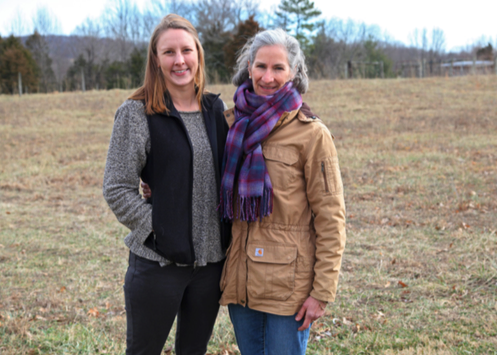If you can connect and have a good relationship, farmer to landowner, this can be an amazing, beautiful and productive thing. It really can work,” says Katharine Wilson, manager of the new Berrey Hill Farm in Madison County.

We held a “Farmland Leasing Social Hour” last year where Katharine, a farming intern at the time, met landowners, Holly and Peter Maillet.
“We saw a gap between aspiring farmers and landowners who want their land in agriculture,” says Jess Palmer, farm and food program coordinator for PEC. “So one of the things we decided to do was host a social happy-hour-style event, where landowners and land seekers can mingle and talk about their property or their business ideas—it’s an opportunity for connections to be made.”
When speaking with Katharine and Holly, it’s immediately apparent the right people have come together to form a partnership. They both seem equally as passion- ate about protecting the health and ecology of the land and building community through healthy food.
“When my husband and I bought our farm, we were thrilled it was already in conservation easement, and the more time we spent here, the more we fell in love,” says Holly. “In the summer of 2015, we had a nice big vegetable garden, and we were having a ball growing all this food. But my husband is a full-time professor at UVA and I’m a botanical artist, and we came to a point that summer where we realized we didn’t want to become farmers.
“But we also have a really strong feeling about the local economy and the local food movement, and we were wondering if there was a way for us participate in that—in a more meaningful way.”
Holly and Peter decided they wanted their property to be farmed, but they wanted to find a farmer who aligned with their mindset and believed in regenerative agriculture, a practice of organic farming designed to build soil health and regenerate unhealthy soils.
Katharine had worked at Bellair Farm in southern Albemarle County for three seasons before she tried venturing out on her own. “As great as it was working at Bellair, I was ready for more responsibility. And I was trying to think about the next step, which was definitely not buying land,” Katharine recalls. “I loved the Virginia central region, and I wanted to stay here. But the high cost of land was prohibiting that as a real option, so I was looking for alternatives.”
After meeting at the social hour event, Katharine continued discussing details about a potential partnership with Holly and Peter.
“We started meeting and getting to know each other, and talking about if we were to partner up. What would this look like? What do we want?,” explains Katharine. “I drafted up a business plan to present, and that was what we started tweaking; and then we finalized things in August.”
Holly and Peter formed Berrey Hill Farm, LLC, and Katharine moved onto the property this past November as the acting farm manager.
“It’s been great settling in and getting to know the property. One of the reasons I love farming so much is because it roots you to the place, and that it really is the piece of land that you get to know, and you never stop learning about it,” says Katharine.
The farm will provide ecologically-grown vegetables, herbs and blueberries, along with eggs from pasture raised hens, this coming season.
“We already have people signed up for our CSA,” says Katharine. “That was really important to us—building community. I think that made us match really well—is how focused on community we are, whether it be from building the local economy here in Madison County or feeding the wider central Virginia community with healthy food.”
Berrey Hill Farm will follow the organic standard, but they will not seek certification due to their current scale and startup budget.
“We’re also doing things like minimal tillage, not using a ton of fossil fuels and trying to stay very aware of all of these things,” explains Katharine. “We want this business to protect the land and treat the soil well with the crops, but we also want the business to be sustainable and profitable. And we want this to happen forever. I want my grandkids to know this land. We’re thinking of this as very long term.”
This article was featured in our Spring 2017 Member Newsletter, The Piedmont View.
